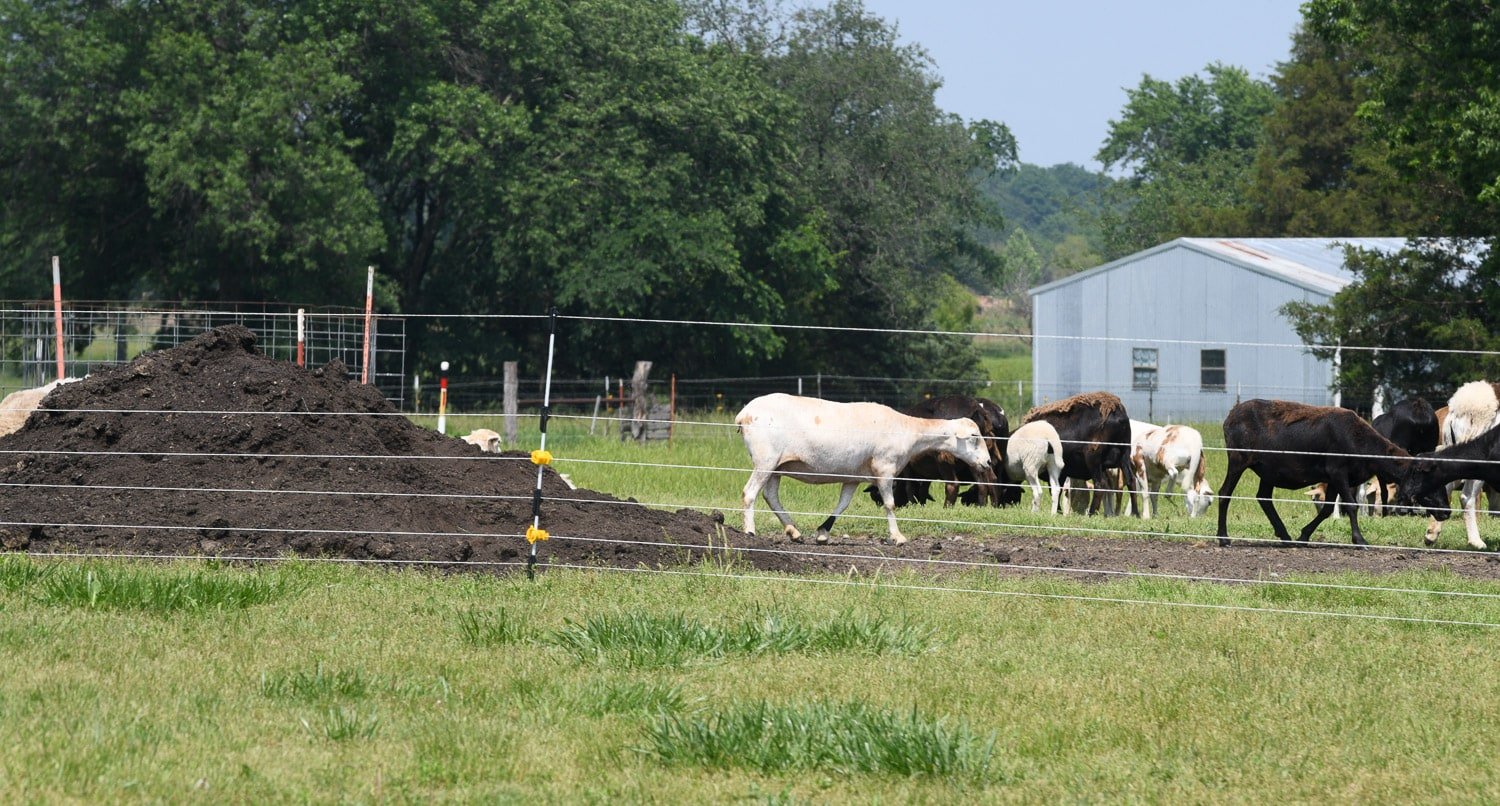
The high tunnel devoted to growing flowers isn’t nearly as crowded since so many have been sold at the market.
See ya’ll at the market

Another high tunnel is giving tomato plants a head start.

Owen Detweiler explains how his new biodegradable black mulch works to Eileen Nichols and Roen Procter. (Photos used with permission)
I got to do one of my favorite market tasks this week – conduct a farm visit.
I now mainly manage grant projects for the market and am rarely here. I had hoped to be at the market on Saturday but didn’t get here in time (long story involving a flat tire in Kansas at midnight). My main purpose at the market was to buy some of Owen Detweiler’s wonderful plants and take them back to Colorado.
Now you may think that’s abandoning my 20+ year habit of sourcing locally, but I live where inevitable hail storms pass through every spring, where land and water are very expensive and where there are just not a lot of local plants available. I’m probably prejudiced but neither the produce or the plants in my part of Colorado compare to those sold at the Webb City market in either quality or value, even at my local farmers markets.
So I try to get back to Missouri in the spring to stock up on annuals and perennials. And the perennials I stocked up on this year, brilliant yellow bloomed tickseed sunflowers, are actually native to where I live so they should do very well in our full sun, heat, and multi-year drought.
Since I was going to Owen’s E&O Farm anyway, I invited the new market coordinator, Roen Procter, and market board member Bob Foos to come along.
One of my assignments on this trip to Webb was to show Roen how I did farm inspections in the olden days. She will, no doubt, adapt my paper inspection forms to something on the cloud, but the basics will be the same – verifying that the farmers are either growing or have plans and capacity to grow all the produce they sell at the market.
This week’s visits will likely be the last of hundreds of farm visits I have made over the years. We began them in about 2002 when I told the farmers that I could not in all honesty continue publicizing that we were a producer-only market unless I visited the farms to ensure that was true.
For the first few years, market volunteer Marilyn Thornberry and I visited every farm twice each year. Once in the spring to verify plans and capacity, and once in high season to see the produce being harvested. That involved a lot of time, especially since we then went out 70 miles as the crow flies. After about five years, we cut the visits to once a year for returning farms, sticking with the two visits for new farms.
I had thought when we began visits that farmers would resist the inspections but they seemed to actually enjoy them. They are proud of what they do and were happy to show us around. In fact, there was only one farmer in 20 years that resisted a farm inspection. He had good reason. He wasn’t growing everything he sold and, as a result, he didn’t get a booth at the market.
Owen, of course, welcomed us and gave us a thorough tour. I took notes as to numbers of plants, acres planted, the sizes of Owen’s three high tunnels, and other details. Bob and Roen documented the production with photos.
All the information will be compiled by Roen to verify production, should any questions come up. It won’t, though, because Owen is scrupulously honest.
Here are a few tidbits from our visit. Flowers and vegetable plants are close to being finished, although I found plenty for my garden and Owen had a lovely display on sale Tuesday. But there’s more to come because the Detweilers are planting 1,800 mums next week. Owen has devoted much of one of his high tunnels to cucumbers. In the tunnel they are protected from pests and trellised so they hang down and mature into beautiful straight cucumbers. He’ll harvest them till fall. Owen has another tunnel devoted to tomatoes. He is harvesting both cucumbers and tomatoes right now.
I was delighted to learn that Owen has planted lunchbox peppers. He introduced this sweet little delight to the market many years ago but hadn’t planted them since. I’m particularly excited about serving them in the Free Kids Meals because they are easy to prepare and the kids loved them raw. Owen will be growing many varieties of peppers this year.
But let’s get real. We are talking about Owen here so we should focus on Owen’s favorite crop, melons – watermelon and cantaloupe. He expects to bring between 2,500 and 3,000 of each to market this year. And that’s more good news for the Free Kids Meal because those kids are happy to eat melon at every market – and so is everyone else. Look for the cantaloupes to come in first between mid and late July.
There are several smart practices Owen has instituted on his farm.
After growing crops in the same area for two years, he fences it off and runs his hair sheep on that land for a year. That gives the land a rest and adds nature’s fertilizer (manure) to the field. He also keeps bees to improve pollination of his crops.
Finally I saw something new at E&O – biodegradable mulch. Weed control is critical when growing produce and most farmers have for the last couple of decades relied on plastic mulch. It’s relatively inexpensive and effective, but oh the trash. Farmers have to spend days in the fall pulling up the plastic, and then they have a huge pile of waste that can’t be burned, composted, or buried.
Owen wanted something better for his farm and after some experimentation has found a biodegradable mulch that lasts long enough for his melons to vine out and create their own natural mulch. The mulch is made of polymers that microbes can consume so it breaks down into CO2, water and microbial biomass. It’s more expensive and he has to work his fields for the later plantings once or twice more then he would with regular plastic, but he said he thinks it is worth the cost and effort to eliminate the waste, and I have to agree. So hurray for Owen!

A large covered patch to the left of the three high tunnels will soon be covered with pots of mums to sell in the fall.

Alternating sheep with crops gives the plot a rest and compost fertilizer.

Owen Detweiler says to look for his cantaloupes and watermelons at the market by mid to late July.

Eileen Nichols founded the Webb City Farmers Market in 2000. From a handful of producers, the market has grown to become nationally recognized.
The Webb City Sentinel isn’t a newspaper – but it used to be, serving Webb City, Missouri, in print from 1879-2020. This “newspaper” seeks to carry on that tradition as a nonprofit corporation.
© All Rights Reserved 2025
DIY website design by Bob Foos